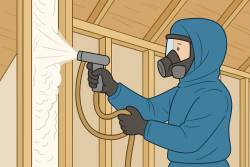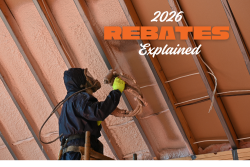Whether you need to add new home insulation, or you are considering revamping the insulation at your place of business, doing some research ahead of time can save you plenty of headaches.
For the most part, commercial insulation and residential insulation are similar. However, it comes down to which type is best for your home or office based on your needs. Therefore, familiarizing yourself with the various forms of insulation is critical.
Installation and removal of commercial and home insulation is typically similar. While commercial structures prefer to use spray foam more than homeowners, both structure types focus on maximizing their R-value, air filtration, and UV stability.
TYPES OF INSULATION USED IN COMMERCIAL AND HOME INSULATION
When selecting insulation, all types perform equally; if they are installed and sealed properly.
Therefore, regardless of the structure that you are purchasing insulation for, consider these factors when picking your type:
- The R Value – R value per dollar is critical. You might notice that one type of insulation has a higher value per inch of insulation than another, and this means that it is more efficient. Depending on your budget, focus on getting the most R value for your dollar.
- Settling Factor – Insulation made from loose-fill fibre and minerals does settle, while fiberglass and spray foam do not. Therefore, to avoid sinking and losing thermal performance for the life of your commercial or residential structure, aim for an option with minimal to no settling.
- Acoustic Control – Acoustic control is more important for an industrial structure than residential, but both would appreciate sound control. To work in a peaceful space, you want fiberglass or mineral wool that offers a higher level of noise control in between spaces – especially if you have multiple office spaces connected to one another. Spray foam insulation achieves a Sound Transmission Class (STC) of 37 to 39, while fiberglass insulation and mineral wool reach up to 43.
- Fire Protection – Fire protection is critical for home and commercial insulation in Mississauga and surrounding areas. Spray foam insulation ignites at 700 degrees Fahrenheit, while fiberglass and mineral wool are non-combustible. Cellulose insulation has a fire retardant added to reduce its flammability factor but is still a fire hazard nonetheless.
- Moisture and Mold Resistance – New insulation is quite a significant upfront investment; therefore, you want to protect your home and office from premature replacement driven by mold and mildew which is a health hazard. Fiberglass and mineral wool are excellent for moisture and mold resistance. Spray foam insulation is impermeable to water; therefore, you would not have mold or mildew growth either.
QUALITY COMMERCIAL AND HOME INSULATION
If you are looking to install insulation in your home or office, contact the insulation professionals at Reitzel Insulation. Our team will help you find the right type of insulation based on structure, budget, and your specialty needs.
Our team proudly offers services to Southern Ontario, and are here to help with your commercial and residential insulation. Call for a no obligation estimate at 1-800-265-8869. You can also reach us by filling out our online contact form.


















